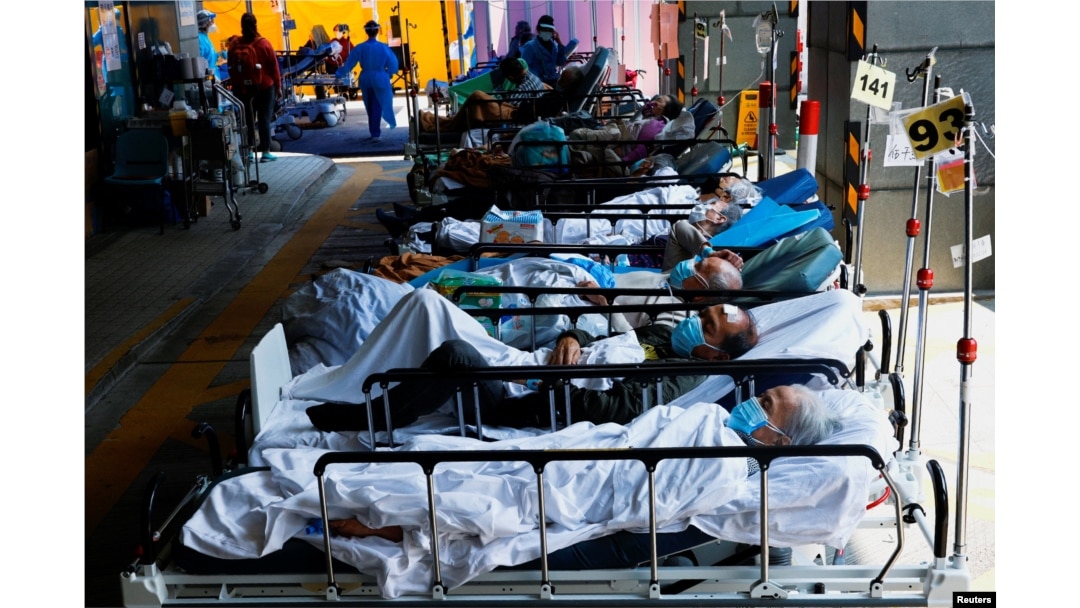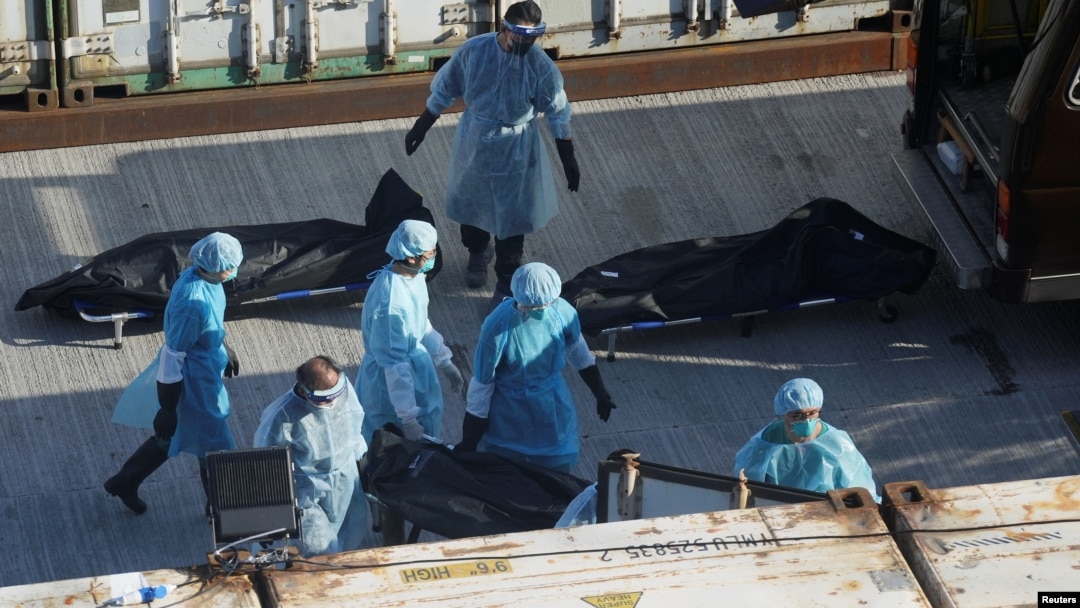Hong Kong holds the world's worst death rate for COVID-19, though the worst wave of the coronavirus has peaked, according to health experts.
Faced with unprecedented spread of the omicron variant, Hong Kong has seen cases spiral, which has led authorities to impose tough measures and compulsory testing.
But cases are finally beginning to drop, health experts say.
Gabriel Leung, Dean of Medicine at the University of Hong Kong, has cited an updated study from the university stating the number of coronavirus cases peaked last week.
"5th wave has peaked on March 4. (Number) of daily infections to fall below 1,000 by end (April) and to below 100 by mid May" was part of Leung's tweet.
Mixed messages
Last week, Hong Kong recorded a daily record high of 56,827 new coronavirus cases. The increasing number of positive cases in recent months has prompted residents to scramble for goods on supermarket shelves as the government has sent mixed messages over a potential citywide lockdown.
In recent days, however, those infection numbers have dropped. Hong Kong recorded at least 28,475 cases Tuesday, the fourth day since new infections were below 50,000.

FILE - Patients wearing face masks rest at a makeshift treatment area outside a hospital, following the COVID-19 outbreak in Hong Kong, China, March 2, 2022.
"I think we peaked 3-4 days ago. Should drop pretty quickly and back to low per day by end (of) March. (This was) following exactly the trajectory I was predicting, a steep and sharp ascent and descent," Dr. David Owens, honorary assistant clinical professor at the University of Hong Kong, told VOA.
More cases could be revealed soon, though, as the Hong Kong government Monday launched an online system for residents to record their infection status after taking a rapid antigen test.
Dr. Karen Grepin, associate professor at the University of Hong Kong's School of Public Health, urged caution on whether the peak has passed.
"It is hard to tell given how incomplete our data are at this moment. But there are some promising signs. But to be clear, even if we are past the peak, rates of infections are still high," Grepin told VOA.
Mass testing
In efforts to get the coronavirus under control, Hong Kong Chief Executive Carrie Lam recently announced a universal testing plan for the entire population this month, with each resident undergoing three nucleic acid tests. Local media had reported the universal testing scheme would commence March 26 and last nine days.
But new reports say the testing could be postponed until April in an effort to focus on reducing the soaring death rate in the city, the South China Morning Post reported.
"Postponing the CUT (Compulsory Universal Testing) scheme makes sense in order to focus on the real priority at the moment, saving lives," Grepin added.
Record death rate
Experts and researchers at the University of Hong Kong have been regularly publishing their forecasts about how severe Hong Kong's fifth wave will turn out to be.
One scenario stated that Hong Kong's current status quo could see more than 5,000 deaths by May, and that would be affected by whether the city's health systems would become overburdened. But one grim forecast published in February said Hong Kong could face up to 7,000 deaths by June.
A worker wears personal protective equipment at a COVID-19 isolation facility in Tsing Yi, during the COVID-19 pandemic in Hong Kong, China, March 8, 2022.
As it stands, Hong Kong's COVID-19 death rate per million people already is the highest in the world. According to data by health publication Our World in Data, Hong Kong has 29.18 new deaths per million over a seven-day moving average as of March 7.
Despite the city administering more than 13 million doses of coronavirus vaccine to a population of 7.4 million, low vaccination levels for elderly residents are contributing to a high death rate. Only 61% of those over 70 and 32% of those over 80 have been considered fully vaccinated with two doses, according to government data.
And 91% of Hong Kong's 2,578 total deaths have occurred in the past three months, with the majority over 70 years old. The city recorded 160 new deaths Tuesday.
Zero-COVID strategy
For two years, Hong Kong has prioritized a "zero-COVID" strategy, aligned with Beijing's effort to control infections across China, which has brought some success. But this year alone, Hong Kong has seen more coronavirus cases than 2020 and 2021 combined.
A health care worker wearing personal protective equipment (PPE) talks to a patient at a clinic designated to treat patients for COVID-19, in Hong Kong, China, March 7, 2022.
Several health experts in the city have said the prospects of Hong Kong returning to zero cases is unrealistic. But Chinese health official Liang Wannian told China state-affiliated media the strategy can be achieved, but in stages, and that the death rates must be reduced first.
"Reducing infection, severe cases and deaths is Hong Kong's most urgent and top-priority target at the current stage. After we achieve the first target, we will then move on to the second and third goals," Liang said.
The University of Hong Kong study also shows that making more beds available for infected patients is crucial to lowering the death rate in the city. The Hong Kong Hospital Authority said last month that hospitals were at 89% capacity citywide. That has prompted the government to seek help from construction contractors in China to rapidly build new medical facilities to ease the pressure on Hong Kong's health system.
Desperate scenes in recent weeks have seen dozens of sick patients in hospital beds facing cold weather waiting to be admitted into fully occupied hospitals.
One health worker from Hong Kong's Caritas Hospital described how her elderly patients from care homes are facing bleak circumstances.
"They cannot do self-isolation, as they are from the same care center. The staffs from those centers (are) probably infected. Therefore, the patients literally have nowhere to go even if they turn negative," she said.


